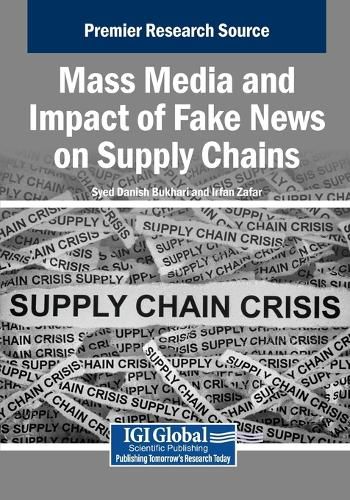Readings Newsletter
Become a Readings Member to make your shopping experience even easier.
Sign in or sign up for free!
You’re not far away from qualifying for FREE standard shipping within Australia
You’ve qualified for FREE standard shipping within Australia
The cart is loading…






This title is printed to order. This book may have been self-published. If so, we cannot guarantee the quality of the content. In the main most books will have gone through the editing process however some may not. We therefore suggest that you be aware of this before ordering this book. If in doubt check either the author or publisher’s details as we are unable to accept any returns unless they are faulty. Please contact us if you have any questions.
In today's interconnected global economy, mass media plays a powerful yet double-edged role in shaping public perception, business decisions, and government policy. The rise of fake news has introduced serious vulnerabilities into supply chains, causing misinformation-driven disruptions, damaged reputations, and shaken consumer confidence. These effects can ripple across industries, triggering shortages, price volatility, and long-term economic instability. Understanding how misinformation spreads and impacts each link in the supply chain is essential for building resilient, transparent, and responsive systems. Tackling this issue requires collaboration among businesses, governments, and the public to improve media literacy, promote transparency, and develop effective countermeasures. Mass Media and Impact of Fake News on Supply Chains reviews major connections between mass media, fake news effects, and implications for supply chains. It examines the impact of mass media on supply chain stakeholders, the businesses and their suppliers, the government, and the customers. Covering topics such as artificial intelligence (AI), global inflation, and traditional media, this book is an excellent resource for researchers, professionals, academicians, students, business leaders, media and communications experts, and more.
$9.00 standard shipping within Australia
FREE standard shipping within Australia for orders over $100.00
Express & International shipping calculated at checkout
This title is printed to order. This book may have been self-published. If so, we cannot guarantee the quality of the content. In the main most books will have gone through the editing process however some may not. We therefore suggest that you be aware of this before ordering this book. If in doubt check either the author or publisher’s details as we are unable to accept any returns unless they are faulty. Please contact us if you have any questions.
In today's interconnected global economy, mass media plays a powerful yet double-edged role in shaping public perception, business decisions, and government policy. The rise of fake news has introduced serious vulnerabilities into supply chains, causing misinformation-driven disruptions, damaged reputations, and shaken consumer confidence. These effects can ripple across industries, triggering shortages, price volatility, and long-term economic instability. Understanding how misinformation spreads and impacts each link in the supply chain is essential for building resilient, transparent, and responsive systems. Tackling this issue requires collaboration among businesses, governments, and the public to improve media literacy, promote transparency, and develop effective countermeasures. Mass Media and Impact of Fake News on Supply Chains reviews major connections between mass media, fake news effects, and implications for supply chains. It examines the impact of mass media on supply chain stakeholders, the businesses and their suppliers, the government, and the customers. Covering topics such as artificial intelligence (AI), global inflation, and traditional media, this book is an excellent resource for researchers, professionals, academicians, students, business leaders, media and communications experts, and more.